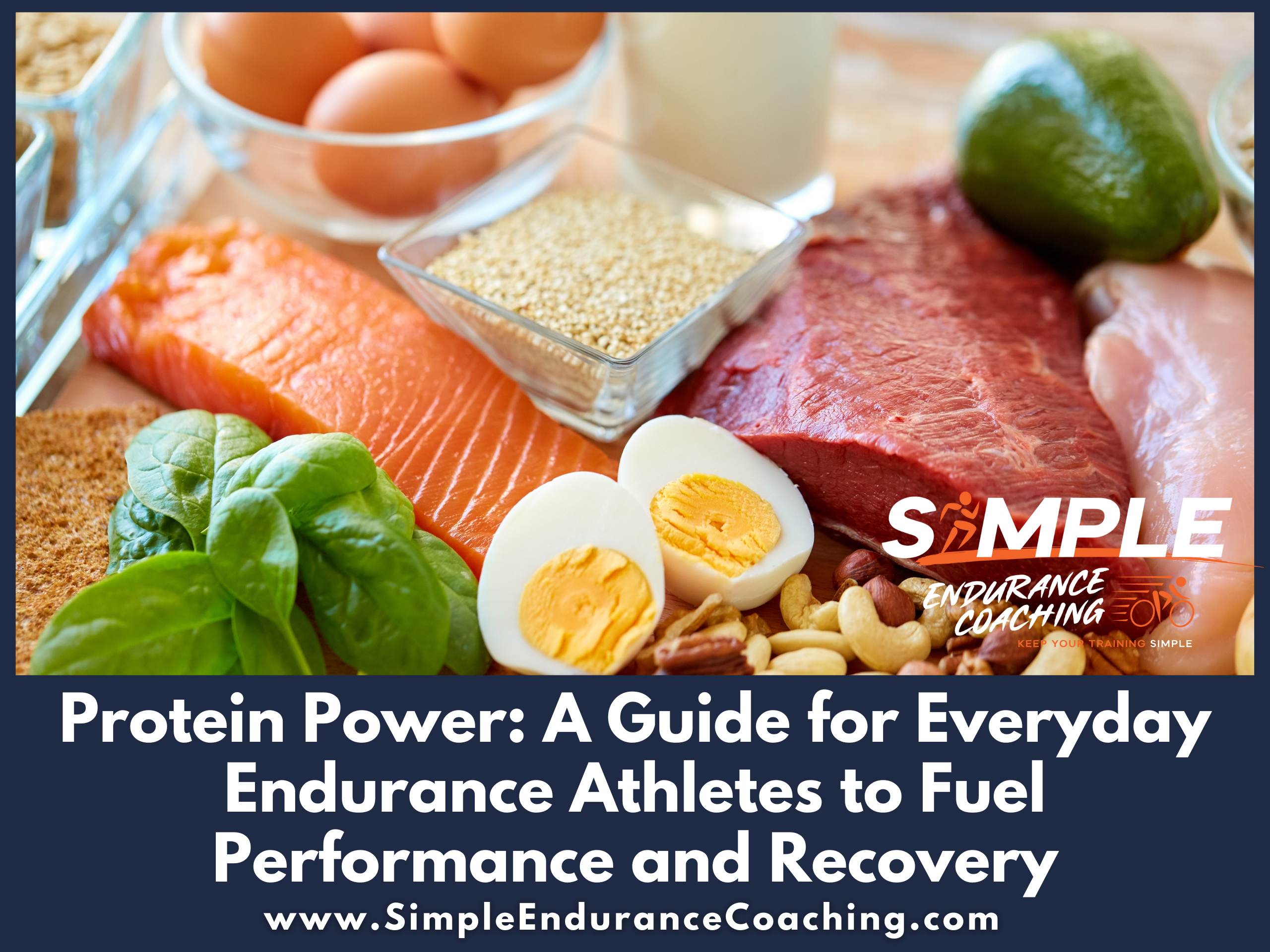In the world of endurance sports, where every stride, stroke, or pedal counts, nutrition is a critical part of success.
Among the various nutrients crucial for athletes, protein stands out as a cornerstone for performance, yet it often remains overlooked or misunderstood.
One thing I say over and over to my athletes is that we usually need more protein in our diets.
Experts recommend about one gram of protein per pound of bodyweight!
Are you getting that much?
In this article, we’ll delve into why protein is essential for everyday endurance athletes, how much they need, the best sources to obtain it from, and the consequences of falling short on this vital nutrient.

Protein is the building block of performance
Protein serves as the building blocks of our muscles, tissues, enzymes, and hormones, making it indispensable for athletes.
For endurance athletes, protein plays a pivotal role in muscle repair and recovery, especially after long training sessions or races.
Endurance activities, such as long-distance running, cycling, or swimming, subject muscles to continuous stress and damage.
Protein synthesis enables the repair and rebuilding of these muscles, helping athletes recover faster and adapt to the demands of their training.
By consuming adequate protein and promoting protein synthesis through proper nutrition and training, endurance athletes can enhance their muscle strength, endurance, and overall health while reducing the risk of injury and fatigue.
Recommended Protein Intake
While the recommended daily allowance (RDA) for protein is modest for sedentary individuals, endurance athletes have higher protein requirements due to increased muscle breakdown and repair. Experts suggest a range of 1.2 to 2.0 grams of protein per kilogram of body weight per day for endurance athletes, depending on training intensity and duration.
Another rule of thumb is one gram per pound of body weight.
Given that an egg is about seven grams of protein, you get the picture that we need a lot to rebuild and improve our performance.
Protein Sources for Endurance Athletes
Meeting protein needs isn’t just about quantity but also about quality.
Endurance athletes should incorporate a variety of protein sources into their diets to ensure they obtain all the essential amino acids necessary for muscle repair and growth.
Animal-based proteins like lean meats, poultry, fish, eggs, and dairy products offer high biological value and are rich in essential amino acids.
Plant-based sources such as legumes, tofu, tempeh, quinoa, nuts, and seeds are also valuable sources of protein, albeit with slightly lower protein digestibility.
Generally, though, I can’t eat enough protein from meat and eggs and use a whey protein supplement after all my workouts.
That is 30 to 40 grams of protein.
After really hard days of training, I’ll take a second bottle of protein shake before bed.
Consequences of Protein Deficiency
Insufficient protein intake can have detrimental effects on endurance athletes’ performance and overall health.
Without an adequate supply of protein, the body may struggle to repair damaged muscle tissues, leading to prolonged recovery times and an increased risk of injury.
Moreover, protein deficiency can compromise immune function, leaving athletes susceptible to illness and fatigue.
Strategies for Meeting Protein Needs
To ensure optimal protein intake, endurance athletes should prioritize protein-rich foods in their diets, especially around training sessions when muscle repair and recovery are heightened.
Meal planning and timing play crucial roles in maximizing protein absorption and utilization.
Additionally, athletes may consider incorporating protein supplements like whey protein, casein, or plant-based protein powders to meet their increased protein needs conveniently.
I add the whey protein shake after every workout, including strength training and cycling.
There’s research that suggests protein supplements before bed also help to repair muscle damage overnight.
Protein supplements are also a good idea for vegetarians since plant-based diets are generally lower in protein density.
Three things to know about protein for everyday endurance athletes:
- Set a goal of consuming one gram of protein per pound of bodyweight.
- Protein is critical for rebuilding muscle damage after exercise.
- Protein supplementation can help you get enough protein.
Need more?
Unlock the secrets to mastering gravel racing with our FREE Guide to Gravel Racing! Get yours here.
BOOK A CALL so we can discuss your goals, answer questions, and talk about making your endurance training more effective, fun, and Simple.
Paul Warloski is a:
- USA Cycling Level 1 Advanced Certified Coach
- RRCA Running Coach
- Training Peaks Level 2 Coach
- RYT-200 Yoga Instructor
- Certified Personal Trainer
- Certified Nutrition Advisor




